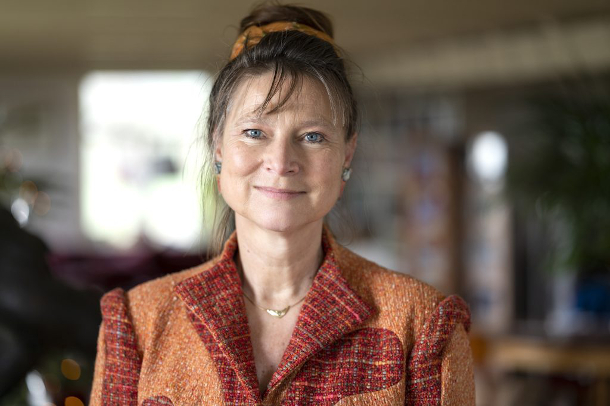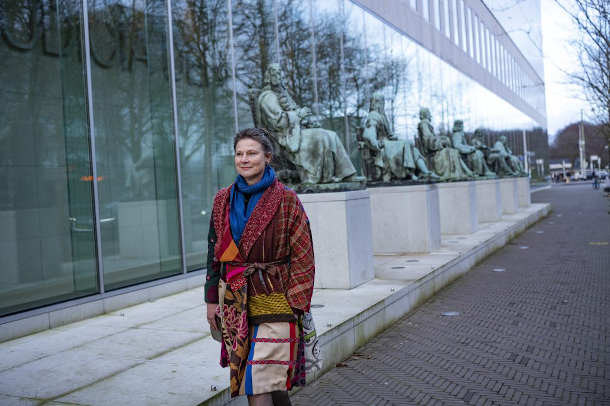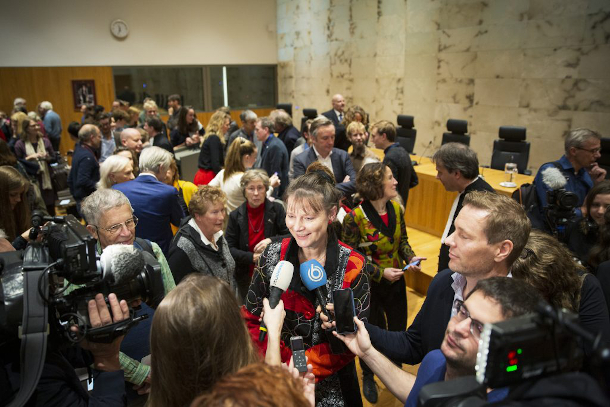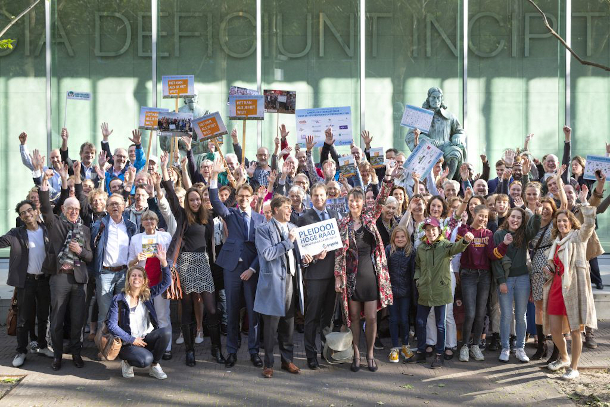Landmark Decision For Climate Action
Air Date: Week of June 10, 2022

Marjan Minnesma is the founder of Urgenda Foundation, the organization that successfully sued the Dutch Government over its failure to protect its citizens from climate change. (Photo: Courtesy of the Goldman Environmental Prize)
Attorney Marjan Minnesma is the European winner of the 2022 Goldman Environmental Prize, in recognition of the landmark suit she and her team won against the Dutch government over its inadequate steps to curb greenhouse gas emissions. She joins Host Steve Curwood to talk about other cases this precedent has inspired, and how climate activists in the United States can take similar legal action.
Transcript
CURWOOD: Each year the Goldman Environmental Prize is awarded to outstanding heroes from each of the inhabited continents. Today we turn to the European winner, attorney Marjan Minnesma. Marjan is from the Netherlands and she and her team successfully argued that the Dutch government must act on its obligation to protect its citizens from the dangers of climate change. That Dutch Supreme Court landmark decision is the first-time citizens have succeeded in suing their own government for failing to meet the challenge of the climate crisis. Marjan Minnesma joins me now for more. Marjan, welcome to Living on Earth!
MINNESMA: Hello, nice to meet you.
CURWOOD: So briefly describe for me the case that you won.
MINNESMA: Yeah, we started already in 2012. And a normally a government should protect its citizens, there's a duty of care to protect your citizens. And if you're not doing enough, this is an unlawful deed. So they should act to protect us. And you can demand this from a judge if your government doesn't act on its own. And that's what we tried. And we won in the Netherlands against the Dutch government, in 2015, the first climate case in the world. And then they appealed and then thereafter went to the Supreme Court. So by the end of 2019, we won finally, after eight years. Our Dutch Government has been forced to do 25% less emissions in 2020. They decided to spend much more money on climate change in the end 45 billion euros, and to close down a coal fired power plant and change the law for the other coal fired power plants.
CURWOOD: Now what types of enforcement mechanisms does this case place on the Dutch government? How will you know that emissions are being cut at the rate that the decision requires?
MINNESMA: Well, for the climate change convention, there is a system in place that every country needs to produce figures every year. So we know every year what the Netherlands has emitted. When we started, we still believed in the rule of law that says that the government will always act and do what the judge says. So we did not upfront ask for anything to enforce it. We have now seen that was not true. So for a next court case, I will put something in place that says if you don't act, then you have to pay fine this and that.

Marjan Minnesma walks outside of the Supreme Court of the Netherlands. (Photo: Courtesy of the Goldman Environmental Prize)
CURWOOD: So you've worked in a variety of fields. Just to name a few that are on your resume: physics, business, international law academia. From your experience, what makes law in particular, an effective means to hold parties accountable in the fight to avoid climate disruption?
MINNESMA: Well, I've been working in the field of sustainability for more than 30 years, and we've tried everything. And in the end, I found out that it's not going fast enough that climate change is going so fast that we will have serious problem this century. And the only way to force government to do what they themselves say that is necessary to do is by bringing them to court and show the facts.
CURWOOD: Why do you think the law was the way that you got it done in the Netherlands?
MINNESMA: In our case, the Dutch government actually agreed that climate change is a big problem with enormous negative consequences and a very big chance to happen. Then the judge said, Okay, if you yourself, say that the lowest level that you really need to do is 25% less emissions in 2020, then you should do that. So courts by looking at the facts, using climate science, and everything that all the countries have underwritten in all those climate change conventions and the Paris Agreement, that's the good thing about the court. It's not political. It's not about PR. It's not about framing. It's about facts.
CURWOOD: The deadlines to keep a relatively stable climate are fast approaching, but the law can oftentimes be slow. Your case took eight years to get to this process. Tell me about the challenges in this regard to using the law to hold climate change aggressors accountable?
MINNESMA: Well, the thing is, we were the very first in the world, but we set up a climate litigation network, and we are now assisting climate cases all over the world. We have translated everything in English. So people would not use the first two years finding things out that we had already found out. And there have been many cases now won up to the highest courts in France and Germany. The young people went to court with the question to the judge, can you please ask our governments to do more? We don't have a life left over if the government doesn't do more. And those two highest judges said, yes, that's true. And that happened within a few years. All those judges look to each other, and learn from each other.
CURWOOD: What advice do you have for people who might want to try to latch on to what you're doing? How could they best get started?
MINNESMA: People that really want to start from scratch, I would say make contact with us. It's called Climate Litigation Network, we have all the arguments from all court cases and find the way that's the best in a certain country, then we could skip a few years and accelerate together.
CURWOOD: From your perspective in the Netherlands. How democratic do the United States's courts systems appear? Are the democratic enough, or do we have too many problems?
MINNESMA: Well, what I see from here is that your judges are much more political than ours. In the Netherlands, the Supreme Court is not selected by politicians. So from a distance, it looks as if our judges are really judging based on facts and science and the law system. But I think everywhere people will see that climate change is a real serious problem for the whole young generation that is already alive and all those thereafter. And that you as a judge might I think I have a role to play. And I think that's what happened here in the Netherlands. And it must have been for those judges in the Netherlands also something challenging to say something with such a big impact, because there were lots of people that were saying this is impossible, they will surely lose in appeal. And in the end, we did win. And I think because of those judges that look simply at the facts, then a judge can force the government to do more to protect the citizens.

Marjan Minnesma is interviewed in the courtroom. (Photo: Chantal Bekker for Urgenda)
CURWOOD: What can be done in the United States? What kind of legal action should be brought here?
MINNESMA: You already see in your country, the droughts, the enormous fires, and everything is more, earlier, quicker, more often. So it's so obvious that climate change is already hitting us. And in some point of time, you should be able to show that this danger is something that can only be countered by government, and not by individual people by taking a shorter shower. So I would hope that a certain point of time, the judges will also say this is enough, and now the government should act.
CURWOOD: Well, one would think that that time had already arrived.
MINNESMA: Yeah, somehow, as a human race, we are very slow with everything. The same with COVID-19. It has to be in your face. And then you act. We start too late, but I hope still in time to avoid the worst.
CURWOOD: What might you suggest for lawyers in China?
MINNESMA: Well, I think court cases like ours work in democratic societies where you still have independent judges. We are assisting people also in South Korea, and there it is possible. So it depends on the country, whether they have still an independent judiciary and a balance of power that's still in place. And then you can try this.
CURWOOD: What kind of personal pushback have you endured? You know, the fossil fuel industry has had a long campaign to keep the burning of fossil fuels going, and they've pushed back mightily in many places.
MINNESMA: Well of course, they have been giving all kinds of information to our government that was not correct. And they tried to postpone things as much as possible. After we won another court case started by Friends of the Earth against Shell. And all those cases put more pressure both on companies and on governments. And I think in the end, they will have to turn around. Over the years, more and more people really read what we did, and have seen that what we asked was something that our government had put a signature under. So I must say that the turmoil became less.
CURWOOD: Tell me what about some upcoming cases that you're really excited about that you think might have major impacts?
MINNESMA: I think the Australian case if the people win that will have a major effect, because Australia is one of the biggest emitters and a very big country on coal. But I'm also very happy about the court cases in France and Germany, where those young people started the court case for 2030. And based on human rights they won. A lot of people still think that we can go on until 2050. Well, then we surely hit more than two degrees.

The successful Urgenda case decision has inspired a string of other activists and lawyers in other countries to sue their governments over climate-change transgressions. Cases in Australia, France, and Germany are well underway. (Photo: Courtesy of the Goldman Environmental Prize)
CURWOOD: What gives you hope?
MINNESMA: Well what gives me hope is that more and more people start to take activities, and they win court cases, but they also go to the streets. I've been also working in renewables for 20 years, and people would say, well, this will be going very slow. But actually the growth of renewable energy is enormous, exponential. So it's a race in time. All the techniques are already there. It's more a matter of wanting and seeing that is really necessary than anything else.
CURWOOD: What's the impact of winning the Goldman prize for you and your work?
MINNESMA: Oh, it's an enormous recognition that people all over the world see that court cases are a very important strategy for fighting against climate change. For my whole team, of course, it's very nice to know that there's so much people watching us because we don't really see that. We are working very hard and making long hours. This type of recognition is just very special. It gives people hope, that all over the world, people are watching and learning from each other and together, we might still do what we need to do in time.
CURWOOD: Marjan Minnesma is the founder of Urgenda and this year's winner of the Goldman prize for Europe. Thank you so much for taking the time with us today.
MINNESMA: Bye bye.
Links
The Dutch Urgenda Foundation, founded by Minnesma
The Goldman Prize’s bio for Minnesma
Brief of the Urgenda Foundation v. State of the Netherlands case
Listen to another LOE interview with this year's Goldman winners
Living on Earth wants to hear from you!
Living on Earth
62 Calef Highway, Suite 212
Lee, NH 03861
Telephone: 617-287-4121
E-mail: comments@loe.org
Newsletter [Click here]
Donate to Living on Earth!
Living on Earth is an independent media program and relies entirely on contributions from listeners and institutions supporting public service. Please donate now to preserve an independent environmental voice.
NewsletterLiving on Earth offers a weekly delivery of the show's rundown to your mailbox. Sign up for our newsletter today!
 Sailors For The Sea: Be the change you want to sea.
Sailors For The Sea: Be the change you want to sea.
 The Grantham Foundation for the Protection of the Environment: Committed to protecting and improving the health of the global environment.
The Grantham Foundation for the Protection of the Environment: Committed to protecting and improving the health of the global environment.
 Contribute to Living on Earth and receive, as our gift to you, an archival print of one of Mark Seth Lender's extraordinary wildlife photographs. Follow the link to see Mark's current collection of photographs.
Contribute to Living on Earth and receive, as our gift to you, an archival print of one of Mark Seth Lender's extraordinary wildlife photographs. Follow the link to see Mark's current collection of photographs.
 Buy a signed copy of Mark Seth Lender's book Smeagull the Seagull & support Living on Earth
Buy a signed copy of Mark Seth Lender's book Smeagull the Seagull & support Living on Earth

